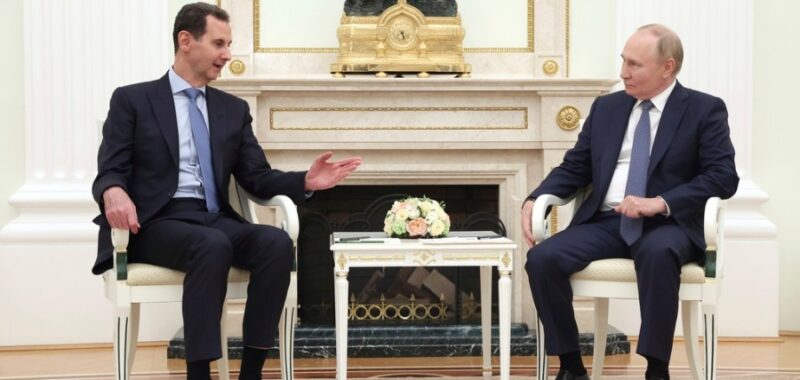
After more than a decade of violent, vicious repression, Bashar al-Assad’s reign collapsed when his chief benefactors, Iran and Russia, focused their resources and attention at home rather than on Damascus.
There are more questions coming out of Syria than answers, but the experience has made one thing is very clear for nations everywhere: Countries in conflict cannot survive without their friends.
It can be argued that the U.S. handed Afghanistan’s Ashraf Ghani the same fate in 2021, when President Biden followed President Trump’s lead, losing patience with this in his own administration supporting a more responsible path. The rapid and total withdrawal of U.S. troops from Afghanistan paved the way for a quick Taliban takeover, a rollback of rights for Afghan women and renewed safe haven for terrorism. It also resulted in the tragic death of 13 U.S. service members and nearly 200 Afghan civilians in a bombing at Abbey Gate in Kabul. In the absence of U.S. action, non-profits and private citizens continue to evacuate and secure visas for those we had promised to help.
For people of my generation, it was a sorry reminder of the fall of Saigon and a symbol of American impotence after 20 years of monumental human and financial investment in Afghanistan.
We don’t know whether the Hayat Tahrir al-Sham rebels who toppled Assad will take better care of Syria than the Taliban has in Afghanistan. They may rule with terror, as fellow Islamist group ISIS did following its lightning expansion, and with access to better military stockpiles and chemical weapons. Or they may finally bring some peace to the Syrian people and end Iranian resupply through Syria to Hezbollah.
Either way, though, you can bet that Volodymyr Zelensky is paying attention. For 1,000 days, Ukrainians have been fighting to defend their sovereign territory, democracy and the lives of 40 million people from an ongoing illegal invasion from Russia characterized by brutal attacks on critical infrastructure and civilian hospitals and the kidnapping of thousands of Ukrainian children.
Support from the U.S. and partner nations, albeit with unfortunate strings attached, has kept Ukraine in the fight but unable to push beyond its initial 2022 counteroffensive. Without that support on the battlefield, Ukraine would fall. The leverage that comes from continued backing also strengthens Ukraine’s hand at an eventual negotiating table.
As he prepares to enter office, President-elect Donald Trump must decide if he will shy away from American commitments to Ukraine like we did in Afghanistan, or whether he will stand by our pledges.
Putting aside the legal, humanitarian and ethical reasons to continue supporting Ukraine, there are two vital national U.S. interests at stake. The first is preventing further Russian aggression. The second is to maintain U.S. deterrence and bolster our alliances worldwide.
If Russia is allowed to “win” in Ukraine — which means anything from military victory to negotiating for significant Ukrainian territory and expanded influence over the Ukrainian government — it will surely not stop there.
Russia is already expanding its influence across Eastern Europe, as demonstrated in recent elections in Romania. Vladimir Putin’s goal is to restore Russia to its prior global leadership position at any cost, including partnerships with China, North Korea and Iran to combat U.S. influence.
After its humiliating failure to take Kyiv in its initial invasion, Russia has re-tooled its military, ramped up mobilization, and built a wartime economy that now produces more weapons and military equipment than the rest of Europe combined, by some measures. Taking a few nibbles out of Ukraine may be Putin’s appetizer, but he is preparing to bite off a much larger chunk of former Soviet territory.
Meanwhile, the U.S. commitment to Ukraine — supported on a bipartisan basis and backed by NATO and non-NATO allies alike — can’t be separated from American commitments elsewhere. Other European nations, Taiwan, the Philippines and other countries that rely on U.S. security guarantees are less likely to trust U.S. pledges of support if, after Afghanistan, we break our promise to Ukraine too.
The word of any American president will lose its value if other countries read it with an expiration date — or if our commitment in one theater can be sacrificed for emerging needs in another.
At the recent Halifax International Security Forum, the former president of Taiwan urged continued U.S. military support to Ukraine despite concerns that such support would lead to fewer arms being available to her country. It isn’t just the U.S. arsenal that our friends need — it is our commitment to sovereign rights and protection of fellow democracies.
If the U.S. won’t stand against bald aggression in Ukraine, why would China think we will intervene in its ongoing “gray zone” tactics in the Pacific? If we turn our back on Kyiv as we did with Kabul, it will be hard to shake the reputation of a paper tiger.
The rushed withdrawal from Afghanistan was the bloody and shameful end result of four presidents wanting to reduce the U.S. footprint in the post-9/11 “forever” wars. If we make a similar mistake by selling out Ukraine to Putin, the result will be a lot worse.
Jane Harman is a former nine-term congresswoman from California who served as ranking member of the House Intelligence Committee for four years after 9/11. She is chair of the bipartisan, congressionally mandated National Defense Strategy Commission, president emerita of the Wilson Center, and author of “Insanity Defense: Why Our Failure to Solve National Security Problems Makes Us Less Safe.”

